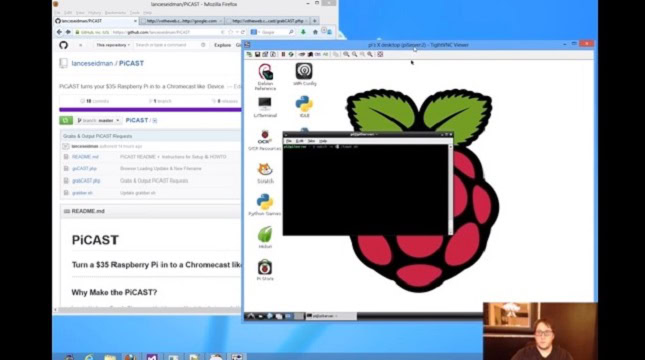Affiliate links on Android Authority may earn us a commission. Learn more.
Say hello to PiCast, the open source solution to Chromecast using a Raspberry Pi

There is a lot to love about the Chromecast. It lets you stream your browser, your desktop, and a number of apps directly to your TV with little more than a $35 dongle that plugs into HDMI on your TV. However, lately, a few problems have arisen. For one, it’s really difficult to find one unless you’re willing to wait weeks for the next stock to come in. Additionally, the root method that was discovered over at XDA has since been patched. So Google isn’t letting everyone play fast and loose with their new dongle. It’s still a great device, but it’s not perfect and now there is an alternative called PiCast.
PiCast was started by a developer named Lance Seidman. The premise? To use a $25-$35 Raspberry Pi computer to do almost exactly what Chromecast can do. It’s an open source project that’s currently in development and it has a lot of promise.
So here’s the layman’s version of how it works. You install the pre-requisite software on your Raspberry Pi, then install PiCast. After that, you can send whatever you’re looking at online to the Raspberry Pi via PiCast. It works pretty much the same way as Chromecast, but requires a little more work to use.
It’s important to note that this is very early on in development. In fact, Mr. Seidman just got YouTube working last night. That brings the total functionality up to web browser support and YouTube videos. So if you want something that works right now, PiCast is only a partial solution. As time goes and the open source community gets their hands on this, you can expect the functionality to increase dramatically. If you’re into this kind of stuff, you can find the Github here and more info here.
The process is currently pretty complicated, so for now it’s probably best to let the experts tinker with this for a little longer. Eventually, though, this will be a very good open source alternative to the Chromecast and, if nothing else, the open source community is going to be excited about that option. So keep an eye out, because PiCast is going to be everywhere very soon. To learn more, watch the demonstration video below or follow Lance Seidman on Google+ to stay up to date on the latest with PiCast.